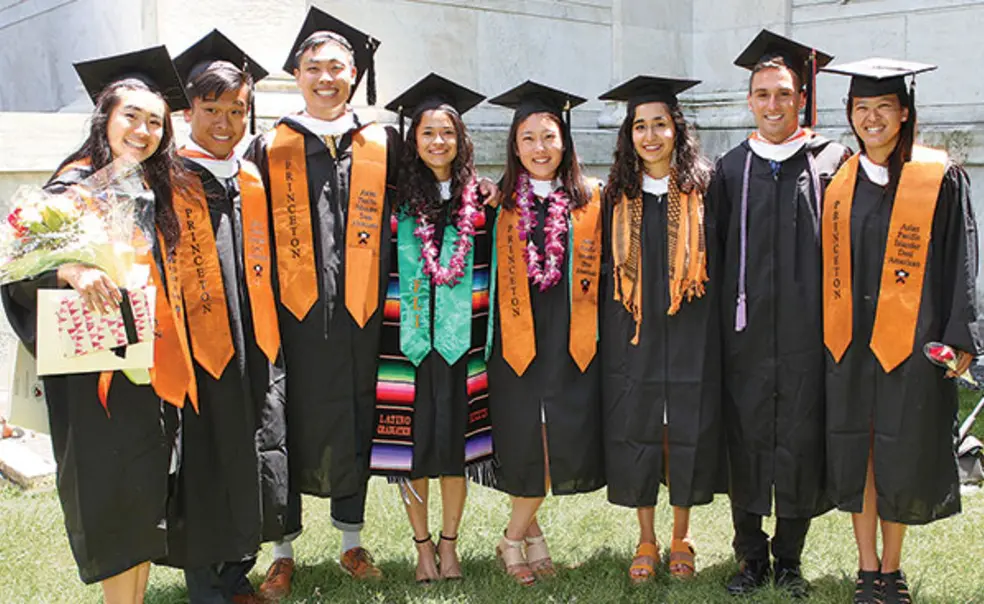Added Celebrations: Seven Special Events
For many students and their families, attending one of the University’s identity-based senior celebrations is a highlight of the Commencement experience.
Each of the seven celebrations — Latinx, Pan-African, First-Generation Low-Income (FLI), Middle Eastern and North African (MENA), Native American, Asian Pacific Islander and Desi American (APIDA), and Lavender (which celebrates LGBTQIA graduates) — has a slightly different program. But each aims to give students “one last gathering among the communities that they’re in, and we try to make it really special for them,” said Tennille Haynes, director of the Carl A. Fields Center, which organizes most of the events.
Total attendance at the seven ceremonies was about 460 students, University officials said, with some students attending more than one event. This was the first year that MENA, APIDA, and Native American graduation events were held.
“We have to celebrate not only our similarities, but our differences as well,” Haynes said. “I think Princeton is inclusive, but I also think that a lot of people don’t always see themselves in a lot of the events that happen here. We want to make sure that these students can see themselves in these [graduation] events.”
Families are invited to attend, and students receive special stoles at each ceremony. Many have a speaker; keynote speakers this year included Telemundo anchor María Celeste Arrarás at the Latinx event, former Iranian ambassador Seyed Hossein Mousavian at MENA, and assistant professor of history Beth Lew-Williams at APIDA.
The Latinx celebration — which has been held for more than 20 years and is the longest-running identity-based graduation event — is translated into Spanish, and for the first time this year, the Latinx and Pan-African ceremonies were live-streamed for the benefit of family members who could not attend. At the Pan-African celebration, Marian Robinson — the mother of Michelle Obama ’85 and Craig Robinson ’83 and grandmother of Leslie Robinson ’18 — was inducted as an honorary member of the Class of 1983.
Sarah Sakha ’18 helped organize the MENA event and described it as a “first step,” but said there is more work to be done. “Especially in the current political climate, this particular group feels marginalized and targeted,” she said.
“Princeton is not easy for anyone, and for a lot of marginalized identities, it can be even more tough,” Haynes said. “We want to celebrate their accomplishments, and we want to celebrate [the students].”












3 Responses
John Polt ’49
7 Years AgoA Question of Language
I am sorry to see Princeton, or perhaps just PAW, succumbing to a senseless linguistic fad, as in “Latinx celebration” of Commencement (On the Campus, July 11). The well-meant aim is of course to recognize that the graduates are not all of one sex (or gender), but I see three problems with this practice.
First, if pronounced as written (Latinks), it’s awkward (try Chicanks!). Second, if pronounced “Latineks,” it does violence to English spelling, which treats “x” as two consonant sounds (ks) without a vowel sound (we write “exit,” not “xit,” “sex,” not “sx”). Third, it violates English syntax. When we say “Latino celebration” we are using an adjective to modify the noun “celebration,” which in English is neuter, an adjective that has nothing to do with the gender of the persons doing the celebrating. Saying “Latino celebration,” as we normally do in English, in no way excludes any gender of celebrant. By the way, in Spanish we would say “celebración latina,” using a feminine adjective to modify the feminine noun, no matter how many non-females may be celebrating.
Editor’s note: Arlene Gamio ’18 has compiled a guide to the term “Latinx.” It can be found at http://bit.ly/latinxguide.
Steven Abt ’04
7 Years Ago'Aesthetic Objections'
It says everything that a 90-year-old white man thinks his aesthetic objections to the term Latinx matter.
Norman Ravitch *62
7 Years AgoAgeism Here?
Mr. Apt! You should be ashamed of yourself. As my mother would have said, you are yourself no spring chicken! And white males of a certain age have as much right to express themselves as you do and as I do. I cannot imagine what sort of youthful bigotry has inspired you.